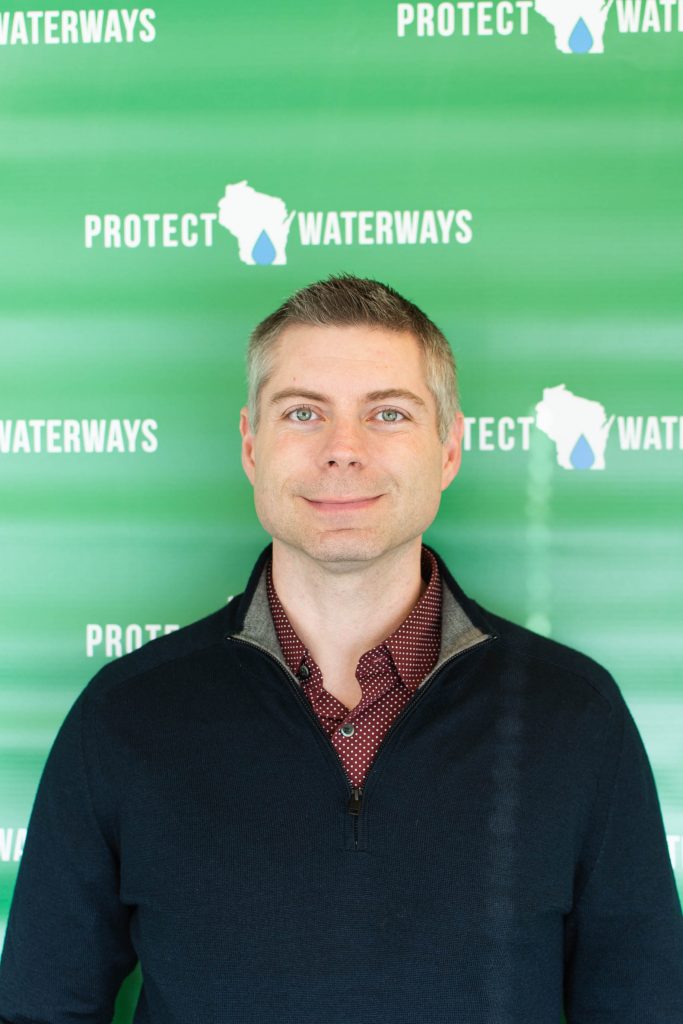What is the Waterway Protector Spotlight?
The Waterway Protector Spotlight is a way for us to recognize people who are going above and beyond to protect our waterways. The people we recognize can be anyone from government employees advocating for safer waterway practices to community members making a difference in their neighborhoods.
Send your nominations for the Waterway Protector Spotlight to [email protected] or through social media!
November 2020 Waterway Protector
Sherry Stanek , Whitewater Urban Forestry’s Chairperson
Sherry has been very involved with not only Whitewater’s Urban Forestry C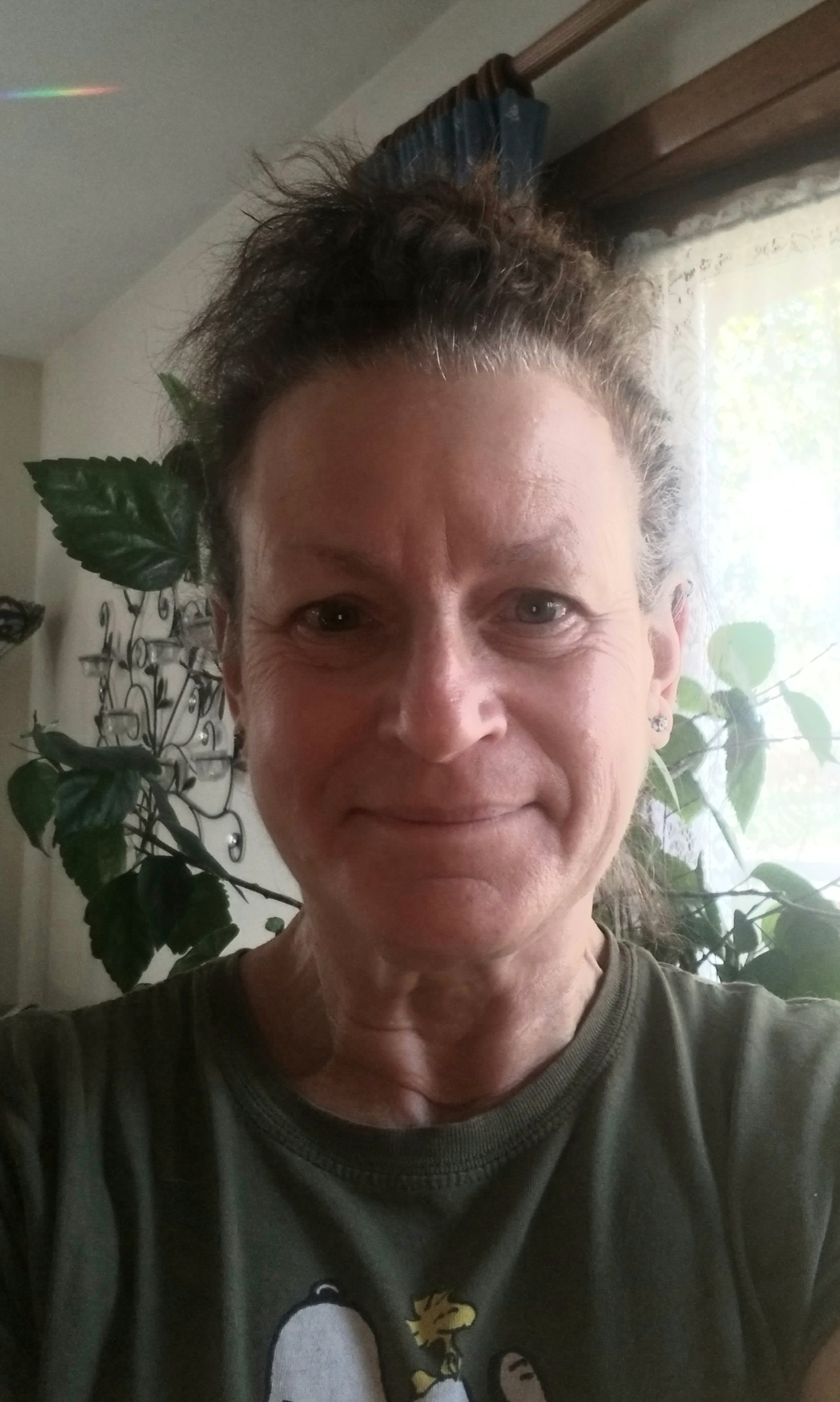 ommission, but also the Rock River Stormwater Group. Here is a little but about what Sherry had to say about salt use, “We believe that most people don’t realize how little salt it takes to clear sidewalks and driveways. Or also how little it takes to salinate the water in our lakes and that desalination is not only very difficult, but very expensive. Many people don’t seem to make the connection that what goes onto the ground then washes into the storm sewers in our streets and then ultimately ends up in our lakes! Being a city that relies heavily on our lakes, their health and their beauty, we believe this would be a very worthwhile effort. If people were informed about how little salt is actually required, our hope is that they would use less! And everyone would win by using less salt, less expense for those who apply it, less residue tracked into buildings, and most of all, less harm to our waterways.”
ommission, but also the Rock River Stormwater Group. Here is a little but about what Sherry had to say about salt use, “We believe that most people don’t realize how little salt it takes to clear sidewalks and driveways. Or also how little it takes to salinate the water in our lakes and that desalination is not only very difficult, but very expensive. Many people don’t seem to make the connection that what goes onto the ground then washes into the storm sewers in our streets and then ultimately ends up in our lakes! Being a city that relies heavily on our lakes, their health and their beauty, we believe this would be a very worthwhile effort. If people were informed about how little salt is actually required, our hope is that they would use less! And everyone would win by using less salt, less expense for those who apply it, less residue tracked into buildings, and most of all, less harm to our waterways.”
October 2020 Waterway Protector
Joe Post , Salt Brine Operator- UW-Whitewater
Joe currently works with UW-Whitewater as a salt brine operator. He was the individual that initially introduced the idea for salt brine implementation on campus and has been helping UW-Whitewater lower its impact on storm water runoff. The work  that Joe has done with the university has helped to set a standard of excellence when it comes to storm water runoff and has helped to implement a culture of of awareness.
that Joe has done with the university has helped to set a standard of excellence when it comes to storm water runoff and has helped to implement a culture of of awareness.
When asked how others can #protectwiwaterways Joe said, “[use the] recommended application levels for salt use, remove snow to prevent ice build-up that requires more salt.”
September 2020 Waterway Protector
Zach Genrich , Student and PWW Account Executive – UW-Whitewater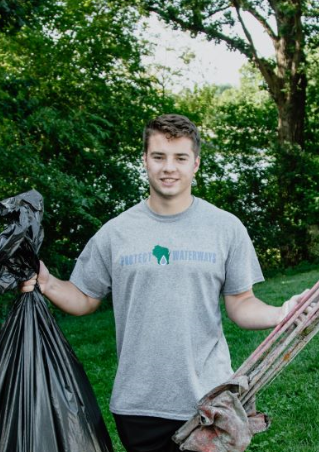
Zach has worked with Protect Wisconsin Waterways for two years now. He has been an incredible addition to the team and has worked in two Clean Sweeps, tabled countless events, and presented to a ton of elementary and middle school kids about the importance of safe storm water practices.
When asked how he #protectswiwaterways Zach said, “I make sure to dispose of hazardous wastes at correct locations and I keep my yard trimmings out of the street” Zach also said that he has taken particular interest in yard trimming disposal because it is a very simple task that many people simply do not know how to perform.
August 2020 Waterway Protector
Todd Janssen , Director of Engineering – Beaver Dam
Todd Janssen is the Director of Engineering for Beaver Dam and has always prioritized keeping Wisconsin’s waterways fresh and healthy! He works tirelessly in the community to educate those that may not understand why keeping our waterways free of pollution has a large impact on the larger ecosystem.
In his day to day, Todd performs regular erosion control inspections of city street projects, as well as private development sites within city limits. He also worked on the Prospect Avenue Storm Water Quality Pond, numerous street projects involving storm water quality components, and the Cotton Mill Park shoreline improvements.
development sites within city limits. He also worked on the Prospect Avenue Storm Water Quality Pond, numerous street projects involving storm water quality components, and the Cotton Mill Park shoreline improvements.
When asked how others can #protectwiwaterways Todd said, “If you see something, say something. I encourage people to contact me if they see an erosion control or storm water violation so that it can be addressed appropriately.”
July 2020 Waterway Protector
Mark langer, City engineer for the city of milton
Mark Langer is a City Engineer for the City of Milton and has been recognized in the community for his great work keeping our waterways clean and spreading the knowledge! 
Mark works in street reconstruction and rehabilitation, utility maintenance, installation and replacement, plan review for private developments. In addition, he prepares DNR required permits for construction, developing plans and specifications for construction projects using DNR BMP’s for stormwater management.
When asked how he would advise others to #protectwiwaterways Mark said, “Stay conscious of how water impacts daily life and of the importance of clean and safe water.”
June 2020 Waterway Protector
Ethan Lee, Parks supervisor for the city of janesville
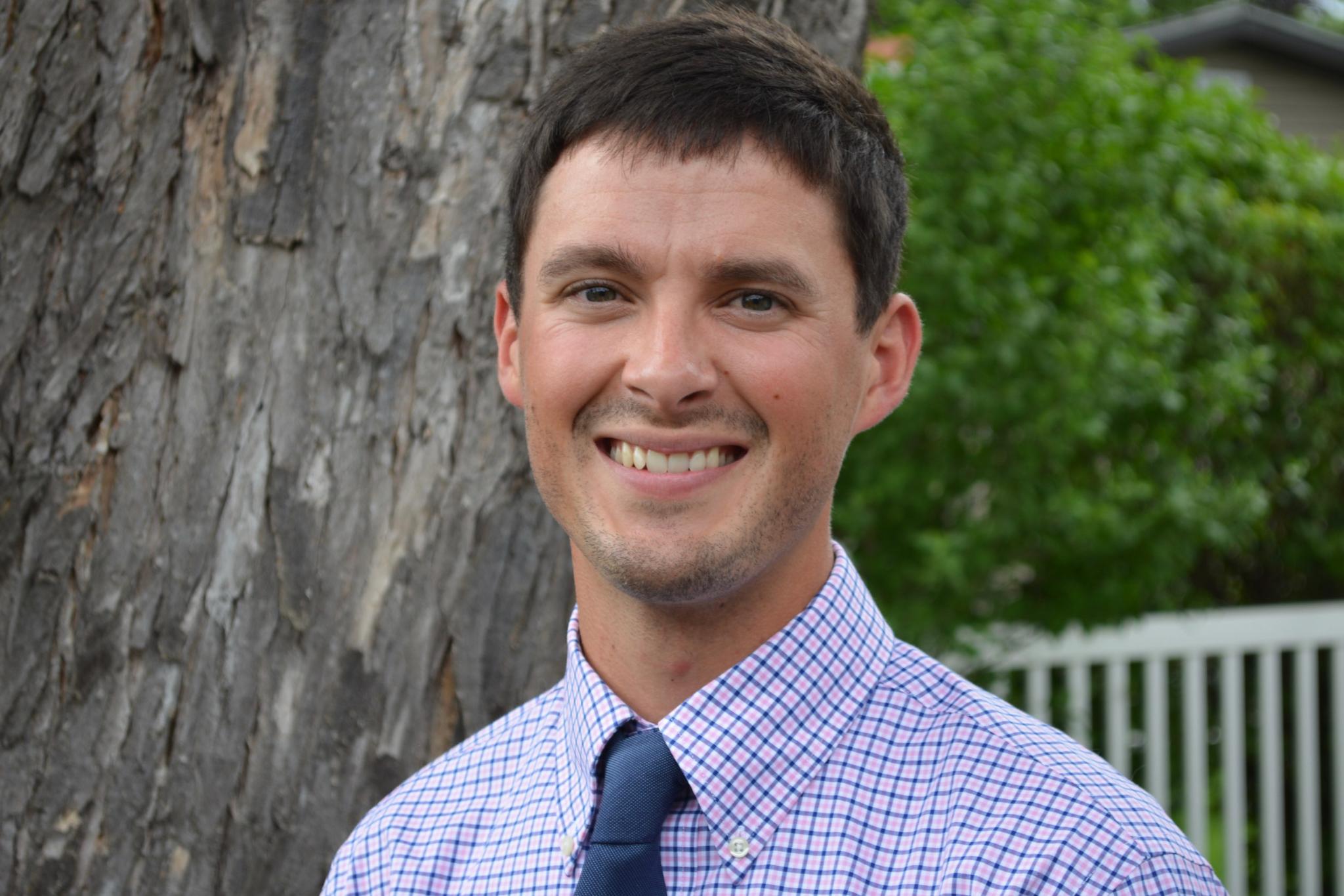
Ethan Lee is a Parks Supervisor for the City of Janesville and he has done his part to keep our waterways clean by managing the upstream stormwater sources which reduces undesirable runoff and silting of our rivers and streams.
When asked how he would advise other to protect Wisconsin’s freshwater resources, he said, “Get out and enjoy the state’s many public waters; go fishing, take a hike, or enjoy a paddle along one of our beautiful lakes, rivers, or streams. I think recreation on public property creates a level of ownership for people which makes them more likely to pickup trash, participate in a clean-up event, or other volunteer opportunities.”
May 2020 Waterway Protector
Brain Huser, Co-Owner/General Manager of Rock River BaitBox LLC
Brian Huser is co-owner and general manager of Rock River BaitBox LLC in Fort Atkinson, WI. He has helped with Rock River cleanups in the past, along with being the Vice President of Friends of the Bark River Fry Hatcher – Fundraising Group DNR Fish Management. Brian considers fish conservation to be extremely important, both for his personal and professional life. Some of his fondest memories as a child, and now as an adult, have included fishing and hunting in Wisconsin waterways with his family and friends. Now that he owns the Rock River BaitBox in Fort Atkinson, which is right on the Rock and Bark Rivers, his livelihood depends on fishing and protecting/conserving that amazing fishery.
When asked how he would advise others to #protectwiwaterways, he replied, “Respect and conserve our natural resources by abiding by fishing rules and regulations, clean up after yourselves (garbage in, garbage out!), respect others’ property, and just be a good sportsman!”
April 2020 Waterway Protector
Brenden Deremo, Former Protect Wisconsin Waterways Account Executive
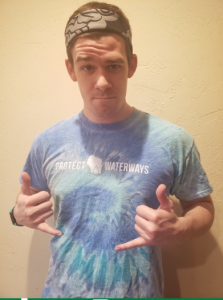 Brenden is a former Account Executive for Protect Wisconsin Waterways. His job was to help schedule and attend events in RRSG municipalities. Two of his larger accomplishments were setting up the PWW summer camp in 2019 and organizing our Annual Protect Wisconsin Waterways Sweep, which occurs every year in September.
Brenden is a former Account Executive for Protect Wisconsin Waterways. His job was to help schedule and attend events in RRSG municipalities. Two of his larger accomplishments were setting up the PWW summer camp in 2019 and organizing our Annual Protect Wisconsin Waterways Sweep, which occurs every year in September.
Outside of working with Protect Wisconsin Waterways, he tries to continue doing his part by spreading his knowledge to family members and peers by making sure to implement better recycling and waste management practices. He even set up a rain barrel in his parents’ backyard.
When asked how he would advise others to #protectwiwaterways, he said, “I advise others to stay informed and do their part to protect our waterways! Something as simple as recycling when it’s appropriate and making sure the garbage gets in and stays in the garbage can goes a long way. If you want to do more, then take the initiative and pick up any garbage you happen to see on the ground as you walk by!”
March 2020 Waterway Protector
Alyssa Herold, Environmental Technician for the City of Beloit
Alyssa works as the Environmental Technician for the City of Beloit. In this job, she works on projects focused around protecting the waterways and the wastewater treatment plant. She works with businesses on their spill control prevention plans, which is a program that protects the sewer system and the environment from the discharge of potentially hazardous materials and site runoff. Alyssa also assists with grease trap inspections when she has the chance. Grease traps are devices that separate fats, oils, and grease in wastewater discharged from food and beverage establishments and other oil and grease generating establishments. She monitors big industries and their wastewater discharges into the sanitary sewer.
Outside of her work with the City of Beloit, Alyssa protects Wisconsin waterways by not using pesticides and fertilizers, picking up after her dog, making sure the storm drain near her home is free of trash, taking her car to the car wash to prevent soap and grime from going directly to the waterways, and using reusable bottles.
When asked how she would recommend others to #protectwiwaterways, she said, “Every little bit counts! There are multiple ways to protect your waterways through little actions you take. Some of the things we can do are picking up any litter and putting it in a garbage can, using lawn or garden chemicals sparingly, and not over-applying salt. Even planting native plants can help, too. Let’s all continue our support in our joint effort to ensure our waterways remain safe!”
February 2020 Waterway Protector
Todd Harmsen, Working Foreman in the Department of Public Works for the City of Waupun
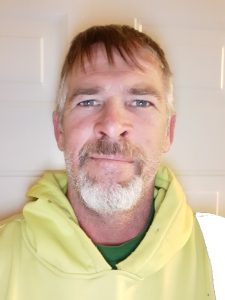
As the Working Foreman for the Department of Public Works (DPW), Todd works on a lot of different projects throughout the year to #protectwiwaterways. Some of these include issuing flyers as warnings to residents who do not blow their lawn clippings back into their yard, maintaining silt fences, doing DNR reports on some required projects, cleaning and repairing storm inlets yearly, and sweeping the streets daily while trees are losing their foliage. Once a year, Waupun also has a waterway clean up where community members and DPW staff come together at Shaler Park on a Saturday morning to pick up trash and debris from the mill pond and river banks. The DPW staff also monitor the Waupun landfill where they store leaves and grass clippings they collect, which is turned into compost. The high schoolers in Waupun also partner with the DPW to paint the curbs near storm inlets to warn people about littering.
When asked how he would advise others to #protectwiwaterways, Todd responded, “Any type of garbage or contaminants on your streets, parks, and parking lots, or wherever they might be, try to remove or clean it up as soon as possible.”
January 2020 Waterway Protector
Dustin Fox, Laborer 1 in the Streets/Parks/Forestry Division for the City of Whitewater
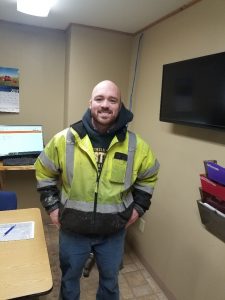
As Laborer 1 for the City of Whitewater, Dustin has worked on many projects such as repairing and reconstructing new inlets, removing sediment and leaves from inlets using a vacuum truck, helping with the building of retention ponds, and repairing/installing new culverts.
To further help protect Wisconsin waterways, he does street sweeping and general maintenance on Whitewater culverts and inlets each year. By removing leaves and sediments from the road, it reduces the amount of material going into connected retention ponds and waterways that can be toxic to animal life and cause algae blooms. He also clears leaves from inlets, to reduce flooding potential, allowing rainwater to reach our waterways. Also, by maintaining catch basins, it allows rainwater to be removed from our roadways without deteriorating the structure.
When asked how he would advise others to #protectwiwaterways, Dustin replied, “A few ways that I help advise people on how to protect our waterways is by encouraging residents to bag their leaves during the fall season and allow us to pick them up and dispose of them properly. I also communicate with my supervisor when residents rake their leaves into the street. The City of Whitewater then sends a Neighborhood Service Officer to the residents so they can inform them of the reasons why not to rake their leaves into the roadway and educate them on our curbside leaf pickup. While repairing/reconstructing inlets or culverts, many people will stop and ask us what we are repairing and why. Letting them know the importance of a well maintained inlet and culvert encourages the residents that we are doing all we can to keep Whitewater waterways safe and well maintained.”
December 2019 Waterway Protector
Ashley Roscoe, GIS Intern and Stream Monitor Coordinator for UW-Whitewater’s Sustainability Office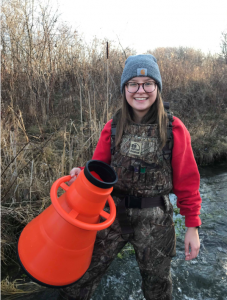
Ashley is a full-time student at UW-Whitewater studying environmental science and geographic information systems (GIS). At UW-W, she works as the GIS Intern and the Stream Monitor Coordinator for the Sustainability Office on campus.
Her main task this semester has been to help the stream monitoring program to become more organized to prepare for the new projects they are starting. One of the new programs the Sustainability Office is participating in is the winter stream monitoring at Bluff Creek near Whitewater, which is something they have never done before. Another new program that has been started is the monitoring of Whitewater Creek in relation to the effects of road salt runoff in the creek. Ashley is going to create a presentation on those effects after gathering the data all winter, since the runoff from parking lots on campus and roads are not filtered before they go into the creek.
Besides her work with the Sustainability Office and the stream monitoring program, Ashley said that to #protectwiwaterways, she goes out and enjoys them. She enjoys kayaking and often finds herself picking up trash in the river or on the banks while still having fun. She is also the student board member for the Rock River Coalition and is able to help protect the Rock River Basin by volunteering her time whenever possible.
When asked how she would advise others to #protectwiwaterways, she said, “I would advise others to simply get out and help clean up their rivers! You can find organizations that put on river clean up days, or you can go out to your local stream with a bag to clean up trash yourself. Another way to #protectwiwaterways is to support local nonprofits that aid in water quality projects, by making a donation or attending an event!”
November 2019 Waterway Protector
Howard Robinson, Director of Public Works for the City of Milton
Howard is the Director of Public Works for the City of Milton. In Milton, since they do not have a natural stream or river, all new commercial developments, residential developments, and public works projects, such as new street installations, are required to have retention or detention ponds constructed. They have areas zoned as conservancy to protect natural water retention areas.
To further protect the waterways in Milton, they plant prairie grass and prairie flowers around the ponds. These plants slow down sediment and also do not require mowing on a regular basis because the prairies are maintained with burnings.
When asked how he would advise others to #protectwiwaterways, Howard responded, “Allow a barrier around the ponds so that sediment does not wash into them. Use native or prairie plants around them. Check the inlets to the ponds during dry weather to make sure the ponds are not accepting non storm water flows. Street sweeping as often as possible helps keep the areas clean.”
October 2019 Waterway Protector
Tim Whittaker, Senior Engineer for the City of Janesville
Tim is the Senior Engineer for the City of Janesville. He has worked on several projects within Janesville that have positively impacted our waterways. Most recently, he assisted with the Monterey Area River Restoration Project on the Rock River. This project involved the removal of the Monterey Dam, shoreline restoration totaling 3/4 of a mile, and the construction of habitat features, kayak launches, and angler access points. Other projects that Tim has been apart of are regional stormwater ponds providing improved water quality, rehabilitation of approximately 15 miles of greenbelt waterway conveyance systems to native vegetation, and smaller-scale shoreline restoration projects on Spring Brook and Blackhawk Creek.
When asked how he would advise others to #protectwiwaterways, Tim said, “First, get to the water and enjoy the outstanding water resources that we have in this area. Then learn about the small behavioral changes that we can all make which, collectively, can have a significant impact on the quality of our waters. Simple things like keeping grass clippings and yard waste out of the street, minimizing the use of fertilizers and pesticides, and keeping trash and any household chemicals out of the storm drains can make a major difference in our lakes and rivers.”
September 2019 Waterway Protector
Andy Selle, City Engineer for the City of Fort Atkinson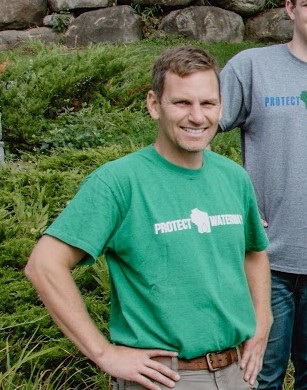
Our featured Waterway Protector for September is the City Engineer for Fort Atkinson, Andy Selle. A few projects that he recently worked on and completed are the Larson Lagoon Stormwater Project and updated the Fort Atkinson stormwater plan to meet the Total Maximum Daily Load (TMDL) requirements.
Besides those two projects, Andy is involved with the education of community members on how they can improve water quality by doing small things around their homes. Some of these things are keeping grass out of the street, cleaning garbage from storm drains, and helping people make the connection between storm runoff and the river as many people are unaware that all rain drains to the river.
When asked how he would advise other to #protectwiwaterways, he replied, “Use the resources, walk the rivers, paddle the lakes, play in the creeks – in this way people will understand their value and shift their habits to reduce the impact and make them a treasured piece of the community.”
August 2019 Waterway Protector
Bill Frisbee, Director of Water Resources for the City of Beloit
Bill is currently the Director of Water Resources and formerly the Storm Water Engineer for the City of Beloit. He has worked on projects such as shoreline cleanups, the construction of a storm water retention basin at the Krueger-Haskell Golf Course, public education programs, and a street sweeping reuse program. Bill also worked on a leaf study to find the best ways to minimize the amount of leaves on the roads.
Aside from his work with the City of Beloit to #protectwiwaterways, Bill keeps lawn clippings out of the street, uses minimal fertilizers, herbicides, and pesticides, and picks up litter along his street (as well as participating in shoreline cleanups). In addition to these things, he tries to minimize his use of single-use plastics that pollute the waterways by using metal straws, skipping the straw and plastic lids for drinks, bringing glass containers to restaurants for left-overs, and bringing his own spoon when going out for ice cream.
When asked how he would advise others to #protectwiwaterways, Bill responded, “We all need to be mindful of how our actions pollute our waterways. Many small changes can have a big impact. The easiest changes are to keep grass clippings and other yard waste out of the street, washing cars and equipment at a car wash or in your yard, minimizing the use of chemicals and properly disposing of trash. If you see a piece of litter, pick it up and throw it in the garbage can.”
July 2019 Waterway Protector
Timothy Kienbaum, Community Development Director/Building Inspector for the Town of Beloit
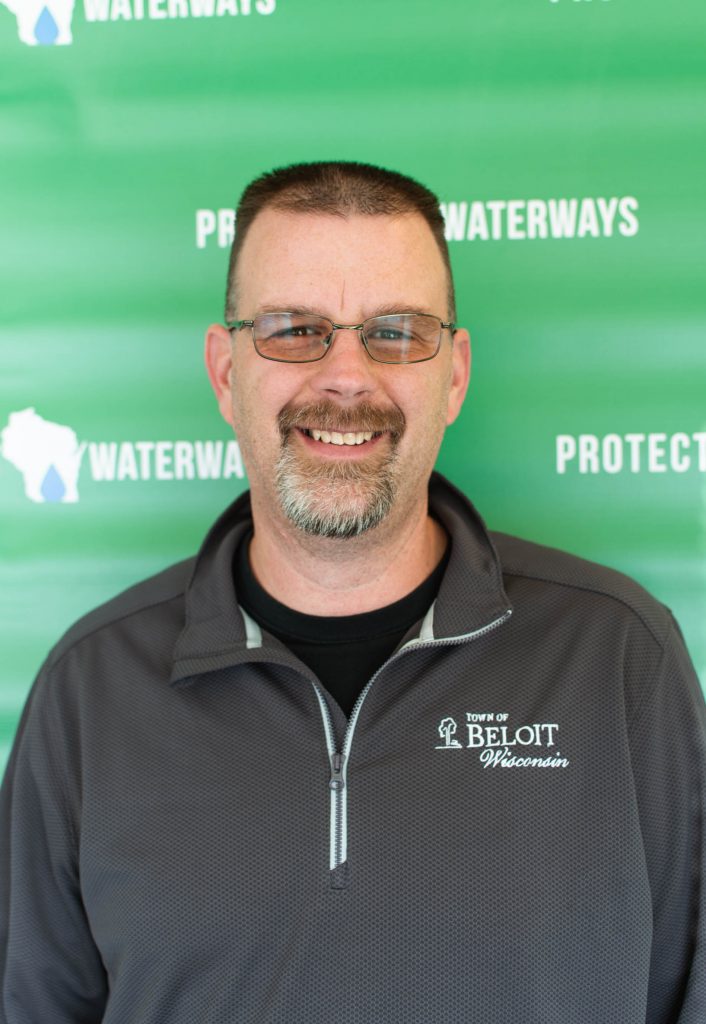
As the Community Development Director and Building Inspector for the Town of Beloit, Timothy has worked on several projects relating to stormwater. He has overseen the installation and maintenance of erosion control measures on construction projects. He has also helped to organize clean-up activities along the shoreline within the Town of Beloit.
To #protectwiwaterways, Timothy monitors construction projects to ensure that the erosion control measures specified in the construction plans are properly installed and maintained.
When asked how he would advise others to #protectwiwaterways, Timothy said, “Be aware of what impact their actions may have downstream, and to avoid dumping leaves, grass clippings, and other items or chemicals where they can be washed into the storm water system and, subsequently, into our lakes, rivers, and streams.”
June 2019 Waterway Protectors
Ritchie Piltz, Director of Facilities and Engineering & Stormwater Utility Manager for the City of Beaver Dam
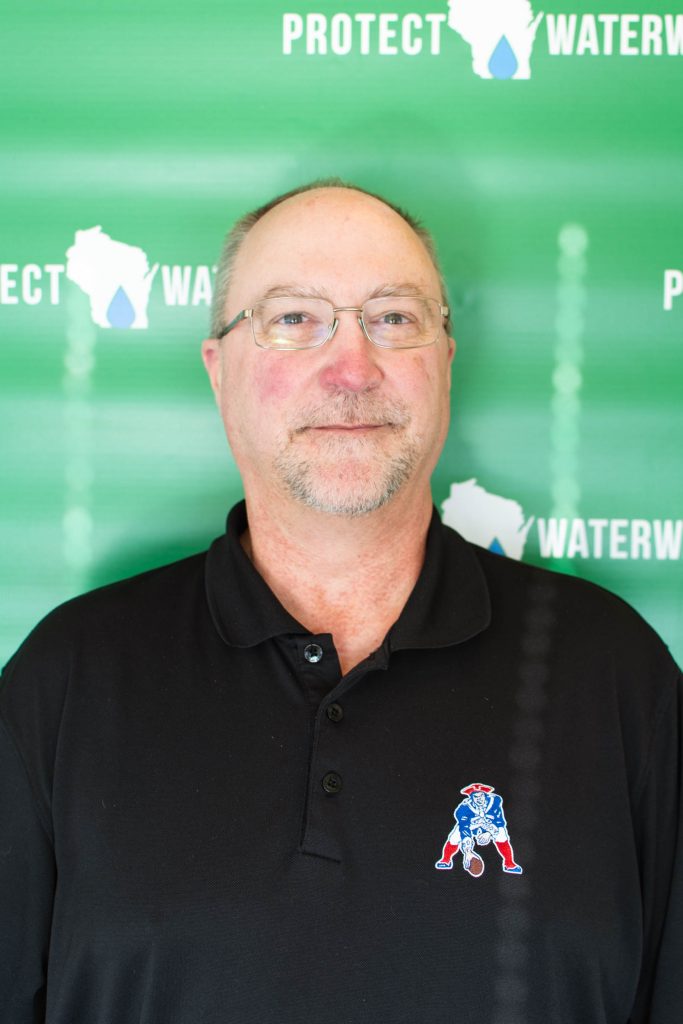
Ritchie is the Director of Facilities and Engineering for the City of Beaver Dam. Also, he is the Stormwater Utility Manager for the city. In these two roles, he has worked on several projects. A few of these include the demolition of buildings built over and in the Beaver Dam River, the removal of two large culverts in the Tower Parking Lot leading to the river, and construction of river flood walls along the river with Riprap Shoreline Protection of the Beaver Dam River.
To #protectwiwaterways, the City of Beaver Dam regularly sweeps the streets and parking lots adjacent to the Beaver Dam Lake and River. There are also scheduled cleanings of inlets and storm sewers. Nineteen stormwater treatment ponds (wet and infiltration) have been constructed in Beaver Dam.
When asked how he would advise others to #protectwiwaterways, Ritchie said, “Please keep leaves and grass clippings out of the storm sewers. Remember, “Only rain in our drains!”
Danny Balister, Content Creator/Freelance Photographer and Past Protect
Wisconsin Waterways Account Executive

When Danny was an Account Executive for Protect Wisconsin Waterways, he ran content creation. This included putting his photography, videography, social media, and other digital content skills to use. He would also work on creating community programs to get the public involved in protecting the waterways. Currently, Danny does freelance creative work for Protect Wisconsin Waterways.
Besides working with Protect Wisconsin Waterways to educate the public on safer stormwater practices, Danny #protectwiwaterways by working to be conscious of his everyday practices and consumption habits that could affect stormwater pollution. He thinks about the product life cycles and unnecessary actions that lead to stormwater pollution.
When asked how he would advise other to #protectwiwaterways, Danny replied, “My advice to others is to be mindful and as present as possible in your daily actions. Try to leave a place better than it was when you found it. Most importantly, be open-minded and consistently educate yourself, teach others, and together we can save mama earth!”
May 2019 Waterway Protector
Jeff Daane, Public Works Director For the City of Waupun
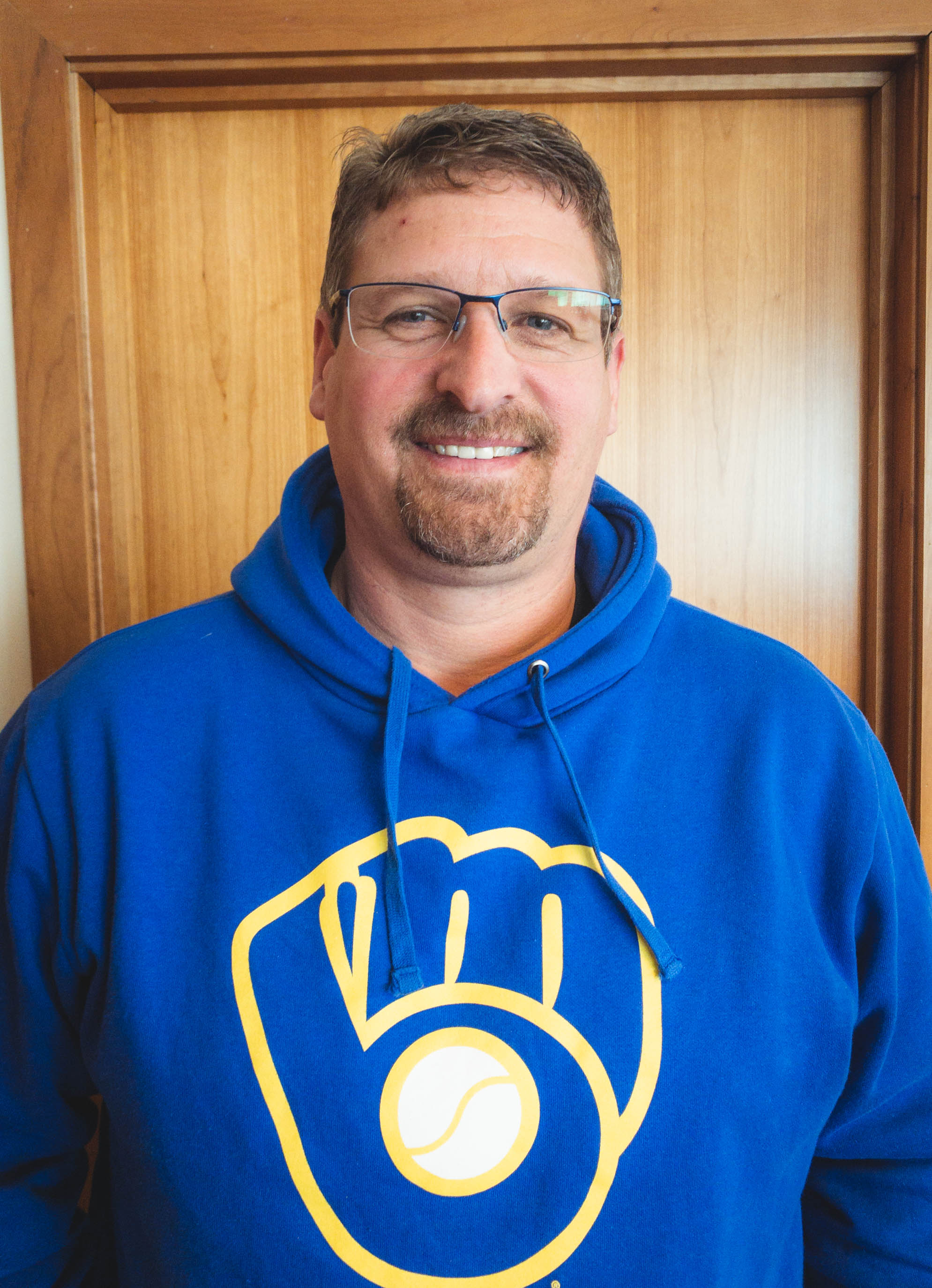
As the Director of Public Works, Jeff helps with several of the projects concerning stormwater in Waupun. He helps with the Rock River clean up each fall, the installation of stormwater ponds that help filter stormwater, street sweeping, and pond inspections.
Besides these projects, Jeff does other things to #protectwiwaterways. He puts signs at construction sites in Waupun with a number to call if people see debris being tracked off of the site and there is an erosion control site plan review. There is a link to the Protect Wisconsin Waterways website on the Public Works webpage to encourage people to learn more about safer stormwater practices. Also, the SDS (Senior Democratic Seminar) class at the Waupun Area High School stencils inlets to inform people that the drain leads directly to the river.
When asked how he would advise others to #protectwiwaterways, Jeff answered, “Use good BMP (best management practices for stormwater pollution). Get the word out that runoff does affect our environment. Do regular inspections of outfalls and stormwater ponds.”
April 2019 Waterway Protector
Brad Marquardt, Public Works Director for the
City of Whitewater
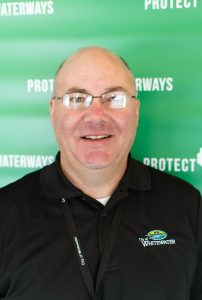
As the Public Works Director, Brad has worked on many projects pertaining to stormwater, such as detention ponds, storm sewers, infiltration, and bioretention areas. The most recent project that Brad worked on was the construction of the Ann Street detention basin, which was in conjunction with the reconstruction of Ann Street. This detention basin helps remove sediment before the stormwater enters Cravath Lake.
Brad helps to protect waterways outside of his job with the City of Whitewater, too. He washes his car on the lawn instead of the driveway, mows the lawn so grass clippings do not end up in the street, and he removes collected sediment in the gutter section of the street.
When asked how he would advise others to #protectwiwaterways, Brad answered, “I would ask others to do what they can to help keep pollutants out of the storm sewer system, rivers, and lakes. Don’t be lazy, go out of their way to properly throw something away, pick up loose garbage or clean up something that has spilled.”
March 2019 Waterway Protector
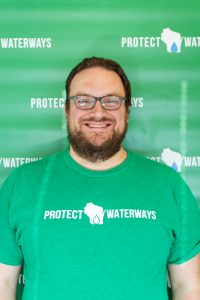 Wes Enterline, Sustainability Coordinator at UW-W
Wes Enterline, Sustainability Coordinator at UW-W
Wes is the Sustainability Coordinator at UW-Whitewater and was the first person to be hired for the position at the university. He has held the role for 10 years and is an alumnus of UW-W with two Bachelor’s degrees.
He manages around two dozen active projects with a special emphasis on campus sustainability through institutional operations, campus and community engagement, and classroom involvement, improving energy and water efficiency, maintaining the campus garden, and Earth Day events!
To #protectwiwaterways, Wes is involved with the Rock River Coalition Water Action Volunteers Program. This program monitors Bluff Creek, Spring Brook Creek, and Whitewater Creek for stream health. They also conduct periodic stream cleanups focused on removing trash from Whitewater Creek.
When asked how he would advise others to #protectwiwaterways, Wes responded, “One of the biggest misconceptions we see is that people on campus don’t understand that all of our storm drains connect directly with local waterways, with the majority of our stormwater flowing directly into Whitewater Creek. Stormwater is not treated by the local water treatment plant. Protecting our local waterways includes being mindful of debris going down the storm drains. We hope that people on campus will avoid littering and pouring liquids down storm drains and let us know if they see any issues so they can be corrected and we can minimize our campus impact on Whitewater Creek.”



